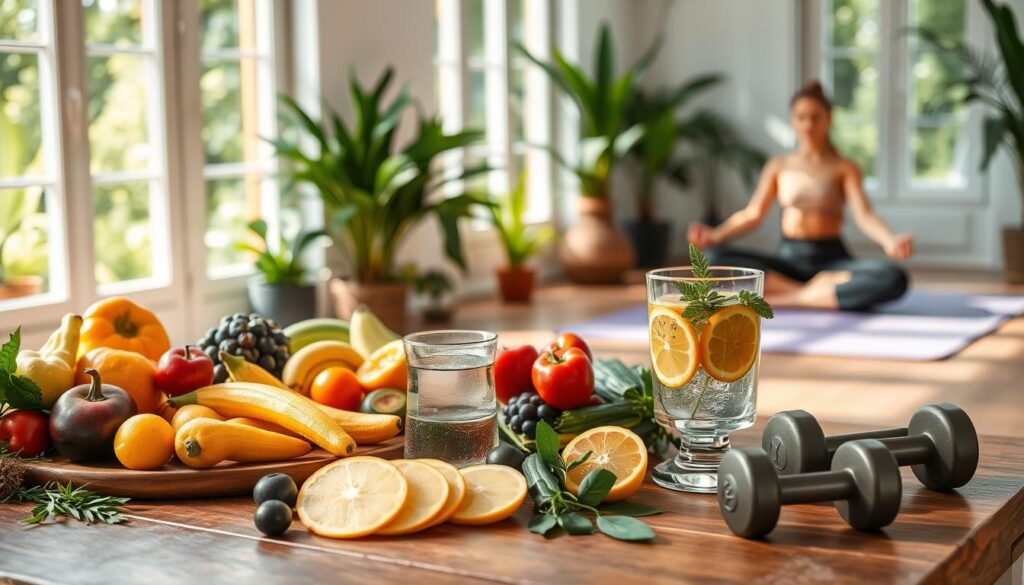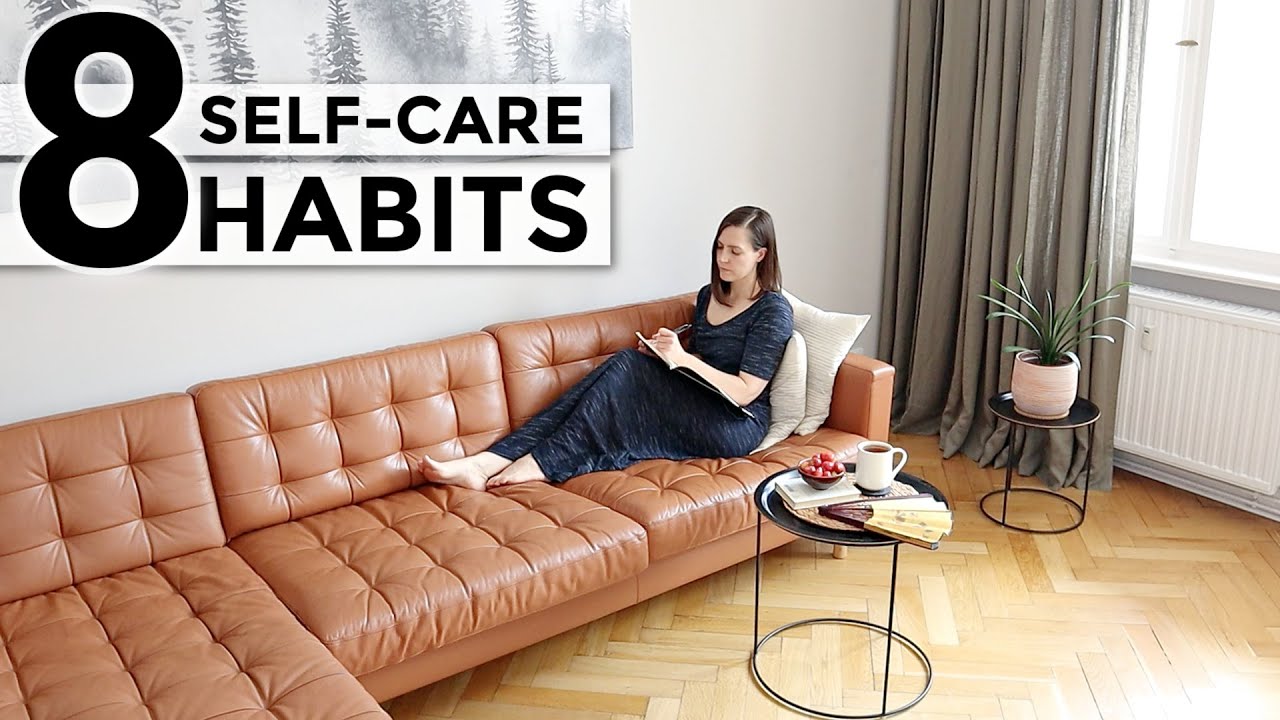Table of Contents
Did you know self-care started in nursing to keep health and manage diseases? In today’s fast world, self-care is more important than ever. It’s not just about treats; it’s about caring for our whole self for the best health.
Life’s demands can make us forget self-care’s value. But, regular self-care has clear benefits. Simple habits can lower stress, boost our strength, and improve our life at work and home.
Key Takeaways
- Self-care covers emotional health, stress, physical health, and growth.
- Putting self-care first boosts awareness, resilience, and life quality.
- Doing things that bring joy now and help us later is key to self-care.
- Self-care should fit what we need and like for the best results.
- Making self-care part of daily life makes it easier and more consistent.
Understanding Self-Care: Beyond the Basics
Self-care is more than just treating yourself. It’s about taking care of your whole self through small actions. It’s not just about occasional treats or pampering. It’s a way to build strength, improve your mood, and stay healthy.
What Self-Care Really Means
Self-care is showing respect and kindness to yourself. It’s about knowing what you need and doing something about it. This includes drinking enough water, sleeping well, exercising, and practicing mindfulness.
Breaking Common Misconceptions
Many think self-care is all about luxury. But it’s really essential for our mental health. It’s not just about spa days or new clothes. It’s about making self-care a part of your daily life.
The Science Behind Self-Care Benefits
Research proves self-care works. Studies show it can lower stress, improve mood, and make us stronger. By focusing on our well-being, we not only feel better but also make those around us happier.
Self-care is a journey of self-discovery and acceptance. It’s about finding activities that make you thrive. By embracing self-care, you can grow in self-awareness and live a more fulfilling life.
The Impact of Self-Care on Mental and Physical Health
Adding self-care to our daily routine can greatly improve our mental and physical health. Research shows that stress can lead to many health issues. But, by focusing on emotional self-regulation, stress management techniques, and healthy lifestyle habits, we can stay healthy and strong.
Doing physical activities like swimming and walking can keep us healthy. These activities also help us stay fit and improve our mood. Taking care of our bodies also means drinking enough water and eating well. Activities like therapy and meditation help us feel less stressed and anxious.
Staying connected with others is key for our health. Talking to friends and joining groups can help us feel better. On the other hand, being alone can harm our health. Spiritual practices like prayer and volunteering give us a sense of calm and purpose. Managing our money well also helps us feel in control.
By taking care of ourselves in all ways, we can feel better mentally and physically. This leads to better emotional self-regulation, stress management techniques, and healthy lifestyle habits.
Essential Daily Self Care Habits for Optimal Well-Being
Taking care of ourselves is crucial, but it’s often overlooked in our busy lives. Simple daily habits can greatly improve our mental, physical, and emotional health. By making these habits a priority, we can improve our overall well-being and succeed in both our personal and professional lives.
Morning Routines for Success
Starting the day with self care can make a big difference. Try adding meditation, journaling, or a brief exercise session to your morning. These activities can make you feel more grounded, focused, and ready for the day ahead.
Evening Practices for Restoration
As the day ends, it’s important to create a calm space for rest. Gentle yoga, deep breathing exercises, or reading a book can help you relax. A consistent evening routine can also improve your sleep and overall wellness.
Mindful Moments Throughout the Day
It’s also key to add mindful moments to your daily tasks. Taking a short walk, practicing desk-side stretches, or pausing for a few deep breaths can keep you present and reduce stress. These small breaks can greatly boost your personal growth and well-being.
Remember, the secret to lasting self care is finding what works for you. Try different routines and find what fits your lifestyle best. This way, you can make self care a consistent part of your life.
Creating Boundaries for Personal Wellness
Keeping yourself well is key, and setting healthy boundaries is a big part of it. Saying ‘no’ when you need to is important for your mind, heart, and body. Also, making ‘no-tech zones’ at home helps cut down on digital distractions. These steps are crucial for a balanced life.
Learning to control your emotions and manage stress is easier with boundaries. By spending less time with people who stress you out, you focus on your growth and well-being. This leads to a better work-life balance and inner peace.
- Recognize when you need to set boundaries to protect your physical, mental, or emotional health.
- Learn to say ‘no’ politely but firmly when necessary, without feeling guilty.
- Create ‘no-tech zones’ in your home or during certain times of the day to reduce digital distractions.
- Limit time with people who make you feel anxious, drained, or less-than.
Setting healthy boundaries is a big act of self-care. It means putting your needs first and controlling your time and energy. This leads to a more balanced and fulfilling life. Remember, setting boundaries is not selfish. It’s a key part of caring for your overall well-being.
Mindfulness and Meditation Practices for Inner Peace
Finding inner peace and emotional well-being is key to our happiness. Luckily, mindfulness and meditation can help a lot. Let’s look at some easy yet powerful ways to manage stress, regulate emotions, and find calm.
Simple Breathing Techniques
Focused breathing is a basic mindfulness practice. It can quickly lower stress and anxiety. Try the 4-7-8 breathing method: breathe in for 4 seconds, hold for 7, and breathe out for 8. Do this a few times to feel relaxed.
Guided Meditation Options
Guided meditations are great for beginners. There are many free apps and websites with expert-led meditations. They help with stress, sleep, or gratitude. Try different ones to see what you like best.
Mindful Movement Exercises
- Yoga: It combines physical poses, breath work, and focus, making it a mindful practice.
- Tai Chi: This martial art is graceful and promotes well-being through its movements.
- Walking Meditation: Focus on the sensations of each step as you walk.
Adding these mindfulness practices, stress management techniques, and emotional self-regulation to your day can greatly improve your inner peace and well-being.
Nurturing Your Body Through Movement and Nutrition
Taking care of our physical well-being is key to self-care. Activities like brisk walks or simple stretching sessions can improve our mood and energy. Eating intuitively helps us choose a balanced diet with fruits, veggies, lean proteins, and healthy fats.
Self-love in food and body choices can change us. Saying no to diet culture and prioritizing nourishing whole foods helps heal. This is especially true for those who have faced trauma or eating disorders.
Adding a big salad to our meals can boost health. Making choices that support our well-being helps us build lasting healthy lifestyle habits and wellness routines.

Whether it’s enjoying exercise or practicing mindful eating, find what works for you. Nurturing our bodies through movement and nutrition leads to a deeper sense of well-being and self-care.
Building Meaningful Connections and Social Support
In today’s fast world, it’s key to keep strong social ties for our mental health. Spending quality time with family and friends, like through video chats or in-person meetups, lifts our mood. It helps fight off feelings of loneliness.
It’s also vital to set clear boundaries in our relationships. This balance helps us build more rewarding connections. Such connections boost our sense of community and belonging.
Quality Time with Loved Ones
Regular time with family and friends is a powerful way to care for our emotional health. Research shows that having friends can make us 50% more likely to live longer. It also lowers heart disease risk. Whether it’s a weekly video call or a monthly dinner, these moments are crucial for our mental health.
Setting Healthy Relationship Boundaries
Healthy boundaries in our relationships are essential for growth and emotional control. This means learning to say “no” when needed and having tech-free time with loved ones. Setting these limits helps us form deeper, more satisfying relationships. It also prevents the harm of chronic loneliness.
Creating Community Connections
Expanding our social circle beyond close friends and family is also beneficial. Getting involved in volunteer work, joining clubs, or reaching out to neighbors can create a sense of community. These connections offer support, opportunities for growth, and meaningful interactions.
By focusing on building strong social connections, we improve our emotional health and personal growth. Remember, social interaction can be more beneficial than other factors and even extend our life span.
Technology Detox and Digital Wellness Strategies
In today’s world, it’s key to manage stress with a technology detox. This helps keep our healthy lifestyle habits and mindfulness practices in check. Too much tech can mess with sleep, exercise, and social time, says Dr. Carol Vidal, MD, PhD, MPH.
Studies link too much tech to problems like attention issues, poor emotional and social skills, and addiction. A 2021 study showed that taking a break from social media helped students sleep better and feel less anxious. This shows the benefits of stepping away from screens.
To take back control, we need a digital detox plan tailored to us, Dr. Vidal advises. This might include:
- Creating “no-tech zones” at home
- Planning screen-free times and breaks
- Turning off unwanted notifications
- Being mindful with social media by unfollowing or muting accounts that harm our mental health
By using these stress management techniques and mindfulness practices, we can find a better balance. This balance is crucial for our overall health and well-being.
Conclusion
Adding daily self-care habits is key for a balanced life. Activities like regular exercise, setting boundaries, and taking breaks from tech help a lot. They also help us feel more connected and joyful.
What works for me might not work for you. The important thing is to find what makes you feel good. Try different things until you find what supports your health and happiness.
Even small steps in self-care can make a big difference. Taking care of ourselves helps us face life’s challenges better. Let’s celebrate our progress and remember the power of self-care every day.

